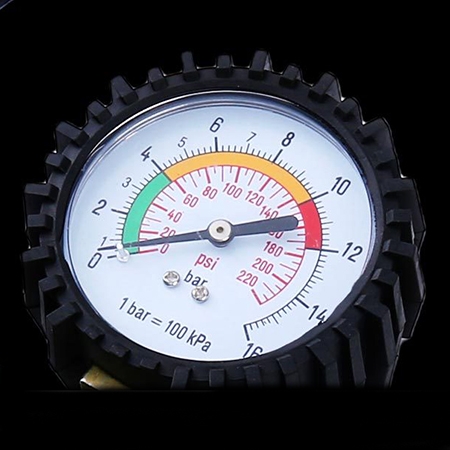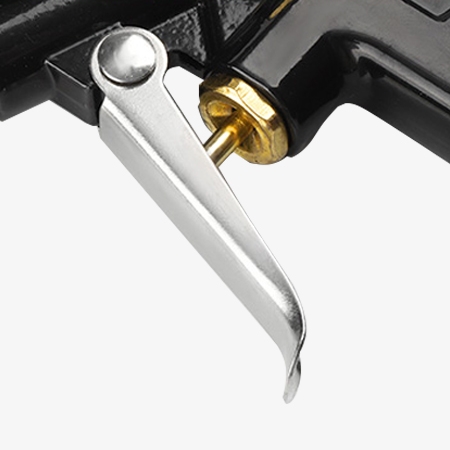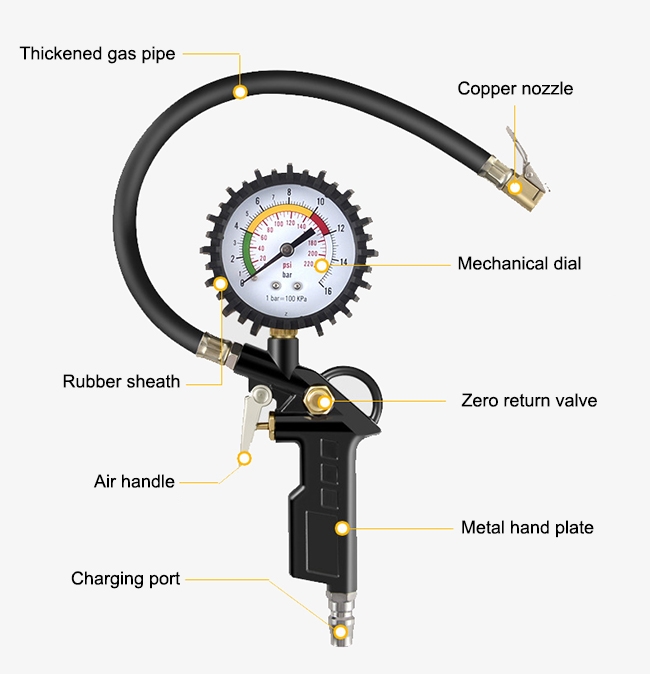High-quality analog tire pressure gauge with 0-220 psi/0-15 bar measuring range. The high-accuracy tire pressure gauge comes with an ergonomic handle, which is portable and easy to operate. It is ideal for tire pressure checking, tire inflating and tire pressure releasing for various vehicles.

The analog tire pressure gauge with two measurement units which is easy to switch
- Dial Indicator: Features a clear, easy-to-read dial that shows the pressure reading in PSI (pounds per square inch) or kPa (kilopascals).
- Increment Markings: The tyre pressure gauge provides precise increment markings for accurate readings.

Humanized handle design
- The metal is strong and durable, and refilling is quick and convenient.
- SISCO professional tire pressure gauge's handle is made from durable stainless steel to withstand regular use and harsh conditions.
Applications
SISCO digital tire pressure gauge is an essential tool for maintaining optimal tire pressure across various vehicles, including trucks, cars, motorcycles, RVs, dirt bikes, and UTVs. It provides accurate and easy-to-read measurements, ensuring safe and efficient driving conditions.

Car

Bike

Truck

Motorcycle
| Model | SISCO-TPG-220psi |
| Measuring Range | 0-220 psi/0-15 bar |
| Units | Bar/ psi |
| Diameter of Dial | 7.5cm |
| Tube Length | 36cm |
| Handboard length | 16.5cm |
| Inflation Port Length | 2.7cm |
| Extended Handle | 5.5cm |
| Weight | 320g |
Details

Q1: How does a tire pressure gauge work?
A1: A tire pressure gauge works by measuring the air pressure inside a tire. When you press the gauge onto the tire's valve stem, air from the tire enters the gauge. Inside the gauge, a calibrated spring or sensor measures the force exerted by the air pressure. This force is then translated into a readable value on the gauge's dial or digital display, indicating the tire's pressure in units such as PSI (pounds per square inch) or kPa (kilopascals).
There are different types of tire pressure gauges, including analog (dial) gauges, digital gauges, and stick gauges. Analog tire pressure gauges use a mechanical spring to provide a pressure reading, while digital tire pressure gauges use electronic sensors to measure the pressure and display the result on a screen. Stick gauges, also known as pencil gauges, have a simple, retractable rod that is pushed out by the air pressure, showing the reading on a marked scale. All these gauges serve the same purpose: ensuring that your tires are inflated to the correct pressure for optimal performance and safety.
Q2: Which type of tire pressure gauge is most accurate?
A2: The most accurate type of tire pressure gauge is generally considered to be the digital gauge. Here are a few reasons why:
- Precision and Readability: Digital gauges typically provide precise readings, often to a decimal point, which can be easier to read compared to analog gauges. They eliminate the parallax error that can occur when reading a dial gauge.
- Consistency: Digital gauges are less likely to be affected by environmental factors such as temperature and humidity, which can sometimes impact the accuracy of mechanical (analog) gauges.
- Calibration: Digital gauges often maintain their calibration longer than analog gauges. However, it's still important to occasionally check and recalibrate any tire pressure gauge to ensure its accuracy.
Q3: Is a tire inflator the same as an air compressor?
A3: A tire inflator and an air compressor are not the same, although they serve related purposes. A tire inflator is specifically designed to inflate tires and usually comes with built-in pressure gauges and attachments that fit onto tire valves. It is typically portable, easy to use, and can be powered by a car's cigarette lighter or battery.
An air compressor, on the other hand, is a more versatile tool that can be used for a variety of tasks beyond inflating tires, such as powering pneumatic tools, painting, and cleaning. Air compressors are generally larger and more powerful than tire inflators, often requiring a separate power source. While an air compressor can be used to inflate tires with the appropriate attachments, its primary function is to provide compressed air for a wider range of applications.
Tips: How to read analog tire pressure gauge accurately?
Considerations for Accurate Readings:
- Temperature Effects: Tire pressure can vary with temperature changes. It's best to check tire pressure when the tires are cold, as driving heats them up and can increase pressure readings.
- Calibration: Ensure your gauge is calibrated correctly. Over time, analog gauges can lose their accuracy. Calibration ensures that your readings are reliable.
- Storage: Store your gauge in a clean, dry place to prevent damage from moisture and debris. Keeping it in a protective case can also help maintain its accuracy and longevity.
Consistent Checking: Regularly checking your tire pressure, ideally once a month and before long trips, can help maintain optimal tire performance, safety, and fuel efficiency. Properly inflated tires wear more evenly and improve vehicle handling.
Using an analog tire pressure gauge is a straightforward process, but paying attention to these details can help ensure that you get accurate and consistent readings, contributing to the safety and efficiency of your vehicle.
Thank you for buying industrial test and measurement equipment on SISCO.com, all products sold by SISCO and the partner cover a 12 months warranty, effective from the date of receiving the products.
What is covered?
SISCO is responsible for providing free spare parts, and free technical support to assist the customer to repair the defective products until the problem is solved.
What is not covered?
- Product purchased from anyone other than a SISCO store or a SISCO authorized reseller.
- Expendable parts.
- Routine cleaning or normal cosmetic and mechanical wear.
- Damage from misuse, abuse or neglect.
- Damage from use of parts other than SISCO approved.
- Damage from use outside the product’s usage or storage parameters.
- Damage from use of parts not sold by SISCO.
- Damage from modification or incorporation into other products.
- Damage from repair or replacement of warranted parts by a service provider other than a SISCO authorized service provider.
- Damage caused by the application environment not meeting the product usage requirements and the failure to perform preventive maintenance.

